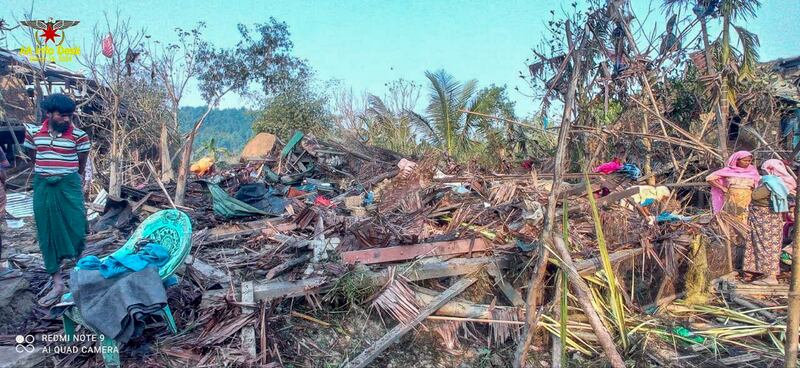Junta airstrikes and artillery bombardments in western Myanmar’s Rakhine state have killed 79 Rohingya Muslims and injured 127 more since ethnic Arakan Army rebels ended a ceasefire with the military in November, according to data compiled by RFA Burmese.
Some 1 million Rohingya refugees have been living across the border in Bangladesh since 2017, when they were driven out of Myanmar by a military clearance operation.
Another 630,000 living within Myanmar are designated stateless by the United Nations, including those who languish in camps and are restricted from moving freely in Rakhine state.
The killings since the Nov. 13 start of the conflict in Rakhine state have further traumatized the Rohingya community and left them fearing for their lives when airplanes appear overhead, they told RFA.
An investigation by RFA found that at least 79 Rohingyas were killed and 127 injured by junta bombardment in Rakhine state as of Monday. They include 27 dead and 43 injured in Minbya township, 24 and 45 in Buthidaung, 17 and 17 in Kyauktaw, four and 17 in Mrauk-U, and seven and five in Sittwe.
At least two mass casualty incidents occurred over the same period.
On March 18, an airstrike on Minbya’s Thar Dar village killed 22 Rohingya and injured 29, according to residents. In January, junta artillery strikes on Buthidaung’s Hpon Nyo Leik village killed 12 and injured 32, sources in the region told RFA.
‘We’re just victims’
A Rohingya resident of Thar Dar village called the mass killing in March “heartbreaking” and questioned why members of his ethnic group are being caught up in the conflict.
“We [Rohingyas] don’t want to take over the country and we aren’t attacking [the military],” he said, adding that the Rohingya simply want to live their lives in peace. “We’re just victims of conflict [between two other groups].”

Restrictions on the Rohingya’s movement make it difficult for members of the community to earn an adequate income. Few have the means to relocate amid the fighting in Rakhine.
A Rohingya from Kyauktaw’s Let Saung Kauk village, where junta bombardment killed six people in February, called the military’s fighter jets “messengers of death” for his community.
“We live in fear that the junta will drop bombs and cry when we hear fighter jets,” he said. “We don’t know whether to flee or stay here and die.”
Attacks on civilians and forced recruitment
Nay San Lwin, a Rohingya activist, said that the junta targets civilians in response to attacks by the Arakan Army, or AA.
"The armed conflict in Rakhine state is between the AA and the army, but the junta responds not only by attacking the AA, but also civilians,” he said. “The military always commits massacres. They burn down villages. Civilians, including Rohingyas, are suffering great losses in the conflicts.”
Myanmar’s military is desperate for new recruits after suffering devastating losses on the battlefield to the AA in Rakhine state. Since November, the military has surrendered Pauktaw, Minbya, Mrauk-U, Kyauktaw, Myay Pon, Ponnagyun, Ramree and Rathedaung townships in the state, as well as Paletwa township in neighboring Chin state.
Residents say the military has forcibly recruited more than 1,000 Rohingyas in Buthidaung, Sittwe, Maungtaw and Kyauktaw townships for military service, and has forced Rohingyas to hold public protests against the AA.
Attempts to contact junta spokesperson Major General Zaw Min Tun for comment on RFA’s findings went unanswered Monday.
RFA’s investigation also found that junta artillery fire, airstrikes, landmines and small weapons fire killed some 187 civilians and injured 531 others in the four months since the start of the conflict in Rakhine state.
Translated by Aung Naing. Edited by Joshua Lipes and Malcolm Foster.
